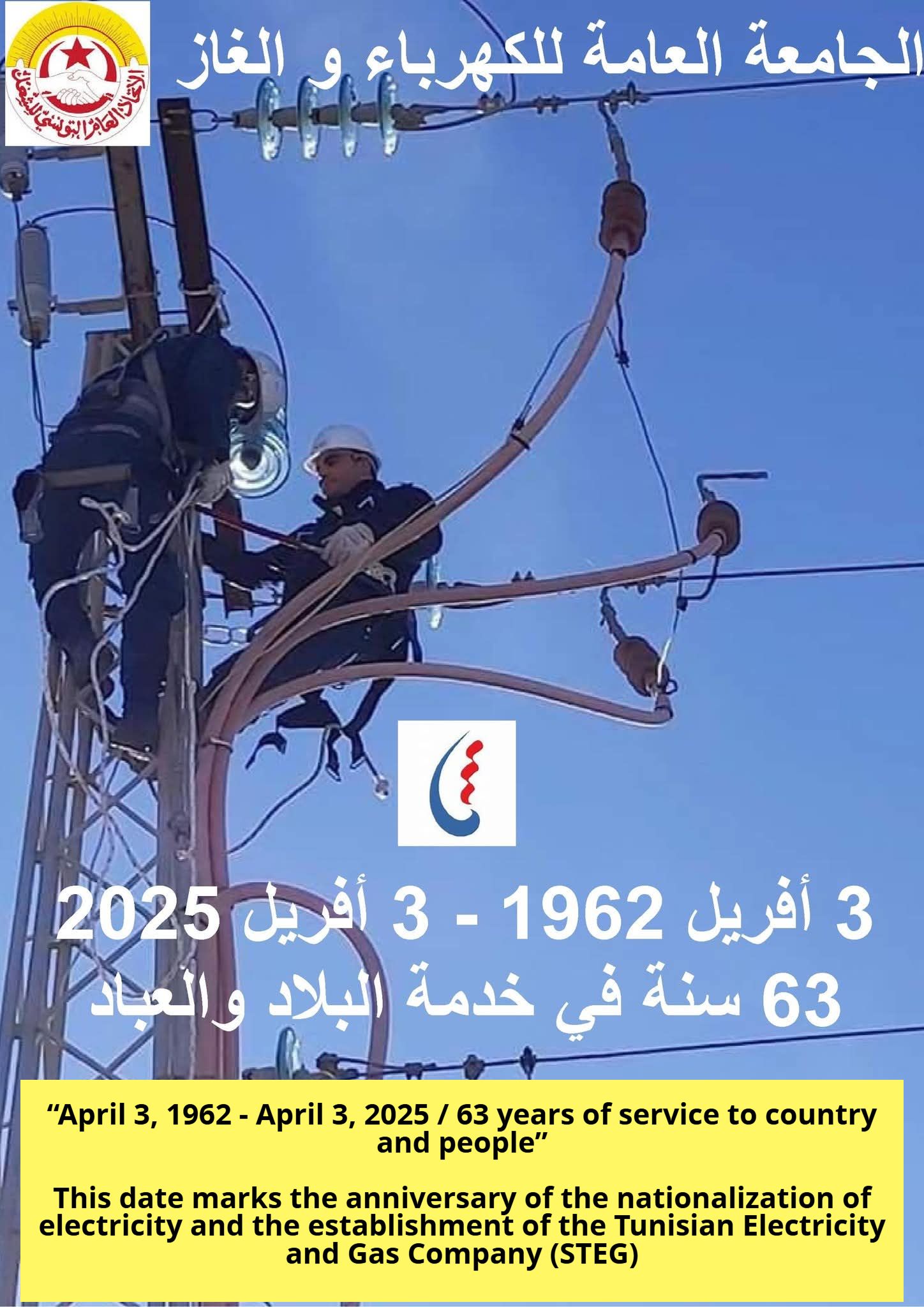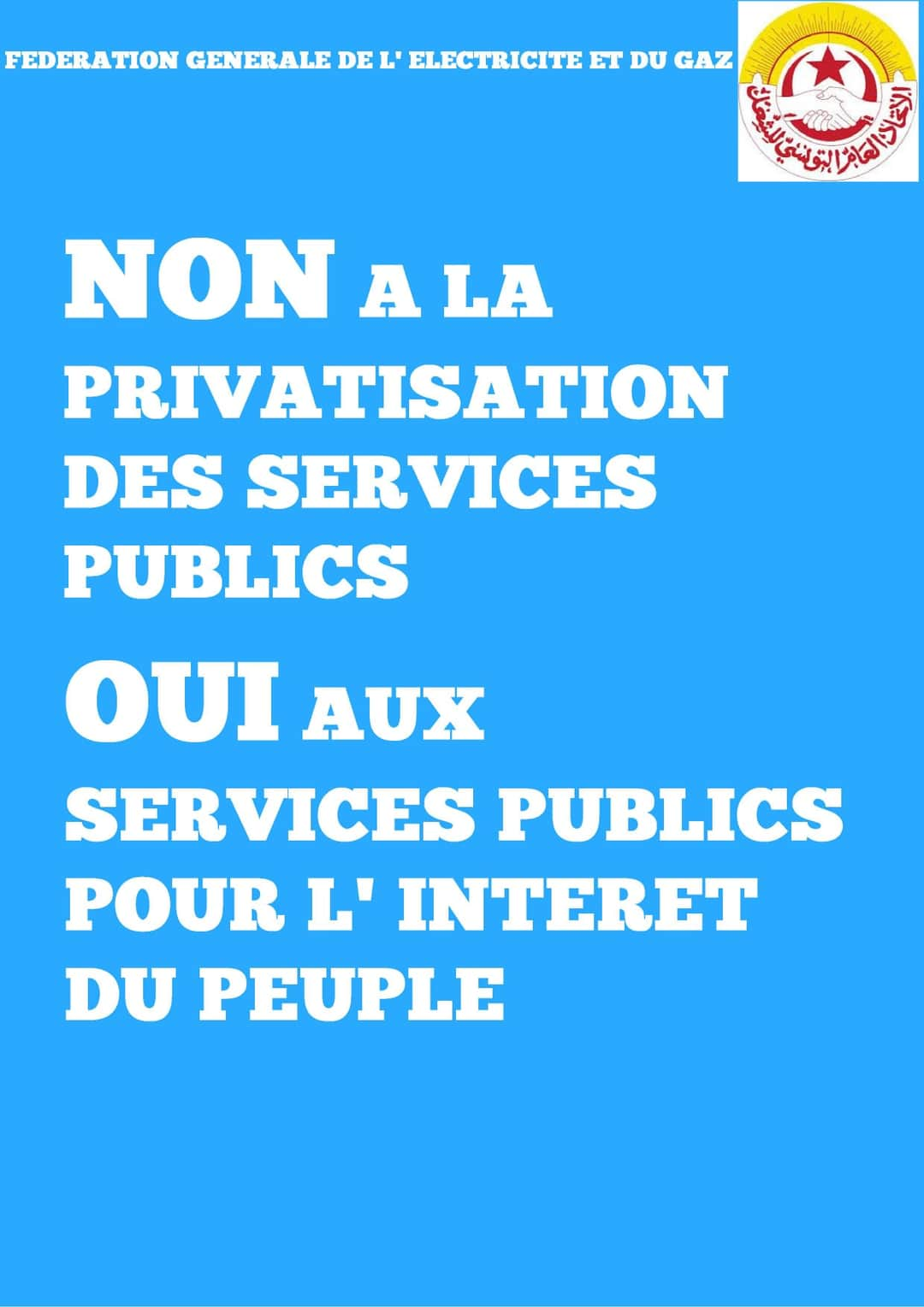sdfsd
By Elyes Ben Ammar, member of the General Federation of Electricity and Gas-UGTT (Tunisia), and Lala Peñaranda (TUED). This article is based on one originally published in the Tunisian Workers Party's newspaper "Sawt al-Shaab" (Voice of the People) on July 25, 2025

SUMMARY: Tunisia’s public power company, STEG, is utilizing load-shedding as a response to decades of being compromised financially and technically by neoliberal policies, rendering it unable to sustain electricity supply during the peak-demand summer months. But what led to this? Government and World Bank measures impeding the public company to make investments in electricity generation. In response, workers of the General Federation of Electricity and Gas (FGEG) and the UGTT national centre organized a national strike with demands to retract neoliberal energy policy and fight for a public pathway. The credible strike threat resulted in successful negotiations with important victories for workers and the fight to reclaim and restore STEG.
Tunis, Tunisia – Over the past few days, there have been a series of power outages across Tunisia. During Tunisia’s sweltering summer months, electricity demand often surges to record-breaking levels as air conditioning systems run at full capacity everywhere from homes and workplaces to grocery stores and hospitals — for those who can afford it.The state-owned Tunisian Electricity and Gas Company (STEG) is currently implementing electrical load-shedding, or “délestage” — a deliberate power-cutting measure. In a statement, STEG explained:
“This outage is not due to regional outages, but rather a proactive measure taken nationwide to avoid the risk of a total collapse of the electricity grid (blackout), due to an unprecedented peak in consumption that affected most of the country’s governorates. STEG confirms that its technical teams have already begun the process of gradually restoring power in various regions and are working at full capacity to ensure grid stability and restore normal electricity distribution as soon as possible.”

The wave of load shedding is expected to continue in the coming period of increasing temperatures and an electricity consumption that exceeds year-round averages. This trend towards deliberate power cuts is usually justified by the need to maintain the stability of the electrical system and avoid total and complete blackouts.
Workers at the General Federation of Electricity and Gas (FGEG in French), the representative union body for all STEG workers, say this justification falls short and is strategically partial. Although plausible from a technical perspective, it misses the forest for the trees.
Government measures impeding the public company to make investments in electricity generation. For example, of the 380 megawatts of renewable energies approved by three ministerial councils since 2016, none have been licensed to STEG. The World Bank has been an important player. The FGEG union reviewed a memorandum of understanding (MOU) between the World Bank and STEG for a 150 million USD loan in 2019, which included an acknowledgment that STEG’s investments should be directed towards transmission infrastructure in order to facilitate feeding of renewable energies generated by the private sector to the electric grid.
In other words, an exclusively (or over-emphasized) technical explanation, though partially true, hides the bigger picture of issues that have long afflicted the public company. The FGEG union, and the Tunisian national centre to which it is affiliated, the General Labor Union (UGTT), have been sounding the alarm for years, pointing to the deeper, general issues facing the STEG public company.
Mobilizations, statements, letters, and other union actions, however, have all been ignored by the government. As a result, in June 2025, FGEG and UGTT workers called for a nationwide strike against energy policies that have favored foreign investors over workers' rights and public services. The nationwide strike was intended to start on July 17, but the union’s credible threat proved effective.

The combination of clear union demands, sustained union pressure, and a strike announcement were successful in leading to a negotiation session between the unions (UGTT and FGEG), the government and key ministries, and STEG.
At the negotiations, the union critiqued government measures and legislation that continue to threaten STEG’s economic sustainability and its ability to guarantee the right to (public) electricity, including the following measures:

At the negotiation, UGTT presented its positions. They presented options for how to overcome the electricity crisis and offered alternative energy policies that respond to the aspirations of the Tunisian people for rights and dignity. The FGEG and UGTT workers’ clarity at the negotiations proved fruitful. On July 14, an agreement was successfully reached, resulting in significant social and worker gains. The General Federation, FGEG, successfully broke the wall erected by the Ministry of Industry, Energy and Mines against all attempts at negotiation and decision-making about the future of Tunisia's energy transition.
The strike announcement (via telegram) and the ensuing negotiation session allowed the unions to demonstrate their political coherence and viable alternatives for a truly just energy transition that breaks with past neoliberal policies and practices. This negotiated agreement also included a number of social benefits:

The economic grant, a type of“worker bonus” to reward overall performance of several technical indicators. The grant is proportional to the evolution of electricity production from one year to the next. It may seem like an innocuous detail but the grant was leveraged against workers’ in their struggle against privatisation.
In 2020, electricity production dropped due to the pandemic and workers did not receive a grant. In 2021, FGEG and STEG protested this, arguing that the negative indicators were beyond the company's control. STEG's board of directors agreed but the Ministry of Industry, Energy and Mines conditioned its approval on FGEG stopping its struggle against privatization. At the time, FGEG was protesting by refusing to connect private renewable energy production plants to the electricity grid. When FGEG refused, workers were denied the grant as a form of punishment. Following negotiations, the Minister of Social Affairs approved the grant, in effect “embarrassing” the Ministry of Industry, Mines and Energy by overturning their decision and favoring the union.
Achieving government grant approval is about much more than the grant itself. This important victory for workers demonstrates the power of worker struggles; the grant itself has become a contested trophy in the larger recognition of a justified struggle.

Following the negotiation victory and after a great deal of hardship experienced by STEG and the Tunisian people, the union's efforts will now focus on two main issues:
Tunisia is currently hostage to the blackmail of the owners of incomplete energy projects (see below). The country has created an absolute reliance on the foreign investment in electricity generation projects that have yet to be completed.
The owners of these projects blackmail the state in order to enjoy additional incentives and privileges and increase their profit margins in exchange for fulfilling their basic obligations. For example:
The current energy policy has failed to meet the country's energy needs. The alternatives are clear. The government should strengthen the public company, which for the past 60 years has proven its merit in electrifying the country and responding to the needs of Tunisian people.

The government should also open the door to new forms of collective development of renewable energies, especially in the local and rural regions. This would be an opportunity not only to achieve a just energy transition but also to encourage just development and enable marginalized groups (e.g. the unemployed) to have viable and economically sustainable projects that provide added-value.
The government could and should have done this decades ago. The neoliberal energy policies have come at a great cost to the Tunisian people and workers. For this reason, the union movement declares: there is no alternative but to fight for public electricity; we cannot waste another minute.
Long live FGEG and UGTT!